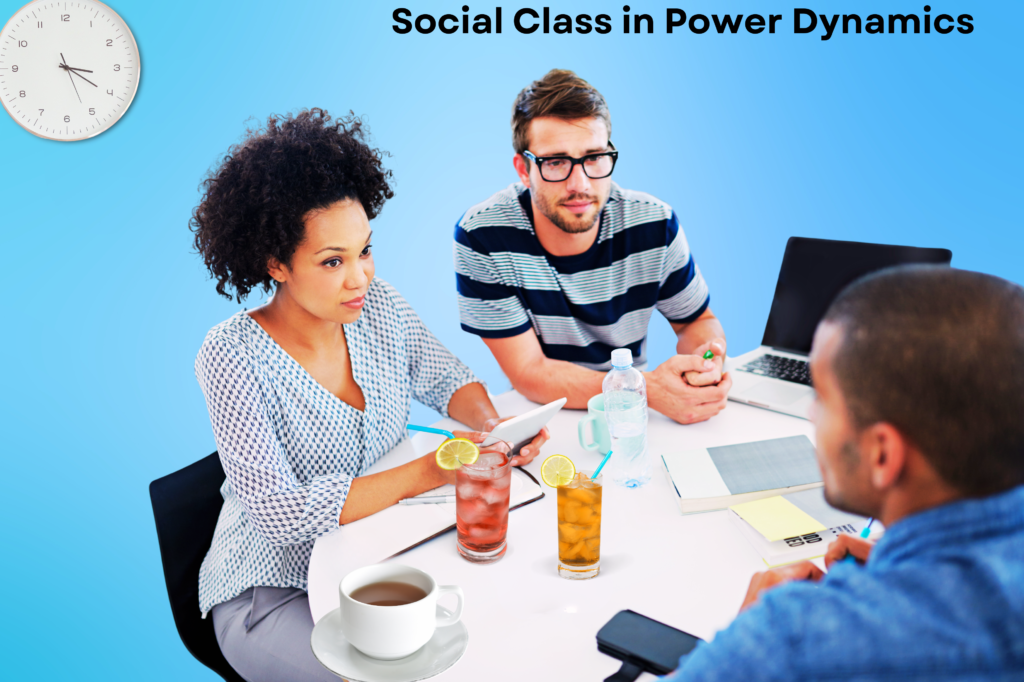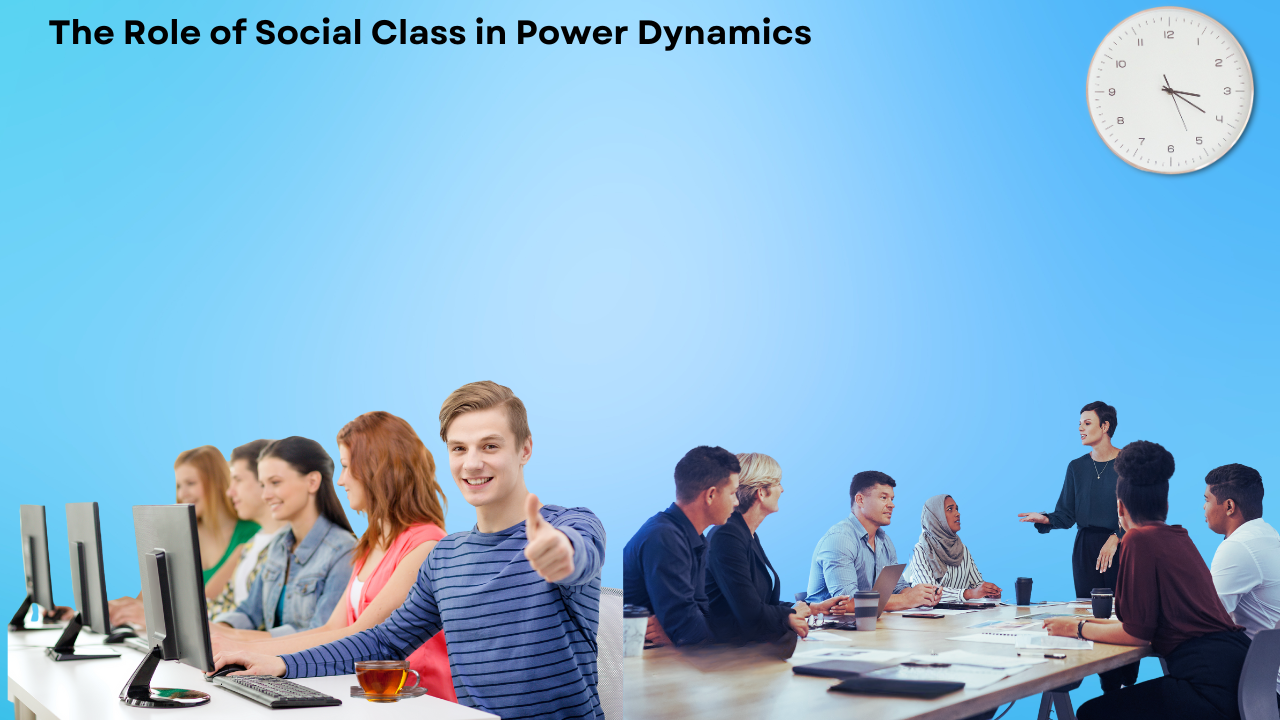Power and class have long been important topics in sociology. These ideas affect how we live together, how we relate to each other, and who can get what resources. Power is the ability to manage or impact other people, and social class is how people are put into groups based on their income. This article will discuss how power and social class are linked and how they affect people and groups.

Understand Social Class
Defining Social Class
Social class is a system of ranks for people and groups based on their social standing, wealth, education, and jobs. People’s chances, way of life, and social connections are often based on their group. There are many ways to talk about social class, but the most popular ones are upper, middle, and lower.
Factors Determining Social Class
Income, schooling, and jobs are the main factors determining social class. People with more money, better education, and more important jobs are usually in a higher social class. People with less money and less education are generally in a lower class.
Social Class Mobility
People can move from one social class to another, a process known as social class movement. When someone travels up in society, their socioeconomic position rises, while their standing drops when pushed down. How mobile someone is depends significantly on their education, family history, and business.
The Role of Power in Society
Defining Power
In sociology, power means managing people, things, and processes. It changes how society works and how people act toward each other. Politicians, business owners, and media figures are all examples of people who have power and are in charge.
Sources of Power
Power can come from many places, such as money, knowledge, physical strength, and relationships with other people. Rich people, for instance, have economic power that lets them affect business and political choices. Experts with a lot of knowledge have intellectual energy and people with strong social networks can link with influential people.
Power Dynamics
The connection between social class and power is very close. People from higher social classes usually have more power, which lets them control resources and make society rules. On the other hand, people from lower social groups often have trouble using their power.
Theories of Social Class and Power
Karl Marx and Class Conflict
Karl Marx, one of the most famous thinkers on power and social class, said that society comprises two main groups: the bourgeoisie (capitalists) and the proletariat (workers). Marx said that people experiencing poverty sell their labour, and the bourgeoisie holds the economic power and means of production. He thought this conflict between classes would finally lead to a revolution in which the working class would eliminate the ruling class.
Max Weber’s Three Component Theory
Max Weber built on Marx’s ideas by putting together a theory of social class with three parts: class, position, and party. Weber says that a person’s class is their economic situation, their standing is their social honour, and their party is their political power. He made the case that these three things together determine a person’s social place and societal power.
Pierre Bourdieu and Cultural Capital
Pierre Bourdieu invented the concept of “cultural capital,” which comprises things like schooling, skills, and social connections that are not money but affect a person’s social class. He argued that cultural capital is a big part of how people move up in society and gain power. For example, an intelligent person with ties to influential people has a better chance of advancing in society and becoming mighty.
Social Class and Economic Power
Wealth Inequality
Lack of wealth is one of the most apparent effects of differences in social class. Wealth builds up faster for people in higher social classes, giving them more economic power. They can change government laws, run businesses, and shape societal values with this power. Lower-class people, on the other hand, often have trouble meeting their basic wants, which limits their power.
Economic Power in Politics
A lot of money is often a sign of power in politics. A lot of money can be used to run for office, fight for good laws, and change how the government chooses. So, what the rich want is more important than what the poor need.
Class and Access to Resources
Social class often affects who can get schooling, health care, and housing. People with more money have easier access to good services, which helps them keep or raise their rank. Lower-class people, on the other hand, have trouble getting to these tools, which keeps them in poverty and makes it harder for them to move up.
Social Class and Political Power
Influence of the Elite
A small group of compelling people is at the very top of society. They are called the elite. They often have essential jobs in business, government, or the media that give them the power to change laws while public opinion. Politics isn’t fair because just a handful of people have a lot of energy, and what most people want is often ignored.
Political Power of the Working Class
The working class has little political power but has used labor unions and social movements to obtain better working conditions, fair pay, and social justice. These group activities have significantly resulted in essential changes like worker rights and social welfare programs. However, compared to the elite, it still needs to be easier for the middle class to impact politics.
Class and Voter Participation
Social class also affects the right to vote. People from higher social groups are more likely to exercise their rights and participate in politics. One reason is that they can get more information about school and politics. On the other hand, poor people might not care about politics, making them less likely to vote and less potent in politics.
Social Class and Cultural Power
Influence on Media and Entertainment
Cultural power is the ability to change a group of people’s views, values, and norms. Cultural influence is vital in the media and entertainment businesses, and people from higher social classes often have more power over these fields. Rich people or companies may own media outlets, which gives them the power to shape public opinion and cultural trends.
Class Representation in Media
How people of different social classes are shown in the media also dramatically affects how people think and feel. People from higher classes are often depicted in movies, TV shows, and the news in a good light, which boosts their status and power. Conversely, lower-class People may be labelled or left out, making social differences worse.
What Education Has to Do with Cultural Power
Another essential part of cultural power is education. People from higher social classes usually have better access to schooling, which helps them build cultural capital and keep their place in society. An education gives you knowledge and enables you to make friends and move up in your job, increasing cultural power even more.
Conclusion
To sum up, power and social class are closely linked in how societies are formed. It is common for people higher up in society to have more power in the arts, politics, or the economy. This power allows them to keep their status, control resources, and affect choices. On the other hand, people in the lower groups face barriers that make it harder for them to get power and move up in society. Knowing the sociology of social class and power helps us see the unfair situations in society and figure out how to fix them so that everyone has the same rights.
